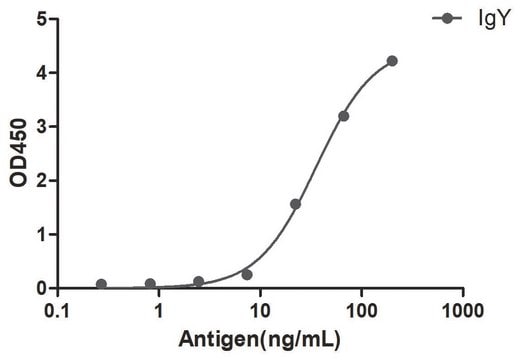推荐产品
抗體表格
affinity isolated antibody
purified from hybridoma cell culture
抗體產品種類
primary antibodies
無性繁殖
LC3C-37, monoclonal
物種活性
human
包裝
antibody small pack of 25 μL
濃度
~1 mg/mL
技術
immunoblotting: 1-2 μg/mL using whole extracts of HEK-293T cells overexpressing human LC3C.
immunofluorescence: 2.5-5 μg/mL using human HeLa cells treated with Bafilomycin A1 for autophagosomes accumulation
同型
IgG1
UniProt登錄號
運輸包裝
dry ice
儲存溫度
−20°C
目標翻譯後修改
unmodified
基因資訊
human ... MAP1LC3C(440738)
相关类别
一般說明
At least 16 genes encoding for autophagy (ATG) related proteins that are required for autophagosome formation were identified in yeast by genetic screens. For many of these genes, related homologs have been identified in mammals.6 The Microtubule-associated protein light chain 3 (MAP1LC3), the mammalian homolog of yeast Atg8/Apg8/Aut7, is essential for the formation of autophagosomes.7 In addition, three human orthologs of yeast Atg8, named LC3A (MAP1LC3A), LC3B (MAP1LC3B) and LC3C (MAP1LC3C), were identified. These three human isoforms show different expression patterns in human tissues.8The LC3 protein exists in two forms, cytoplasmic LC3-I (18 kDa) and autophagosome membrane associated LC3-II (16 kDa). LC3-II is the result of LC3-I cleavage at the C-terminal Glycine by cysteine protease Atg4, which is further modified by the mammalian E1- and E2-like enzymes: Atg7 and Atg3.7 The levels of LC3-II protein correlates with the extent of autophagosome formation.3 Thus, LC3C can be used as an autophagosomal and mitophagy marker.3,7,9-11
特異性
Monoclonal Anti-LC3C antibody specifically human LC3C-I and/or LC3C-II and dose not cross react with human LC3A or LC3B.
免疫原
synthetic peptide corresponding to the N-terminal region of human LC3C, conjugated to KLH
應用
The antibody may be used in various immunochemical techniques including Immunoblotting and Immunofluorescence. Detection of the LC3C band by Immunoblotting is specifically inhibited by the immunogen.
生化/生理作用
Macroautophagy, usually referred to as an autophagy, is a major pathway for bulk degradation of cytoplasmic constituents and organelles. In this process, portions of the cytoplasm are sequestered into double membrane vesicles, called autophagosomes, and subsequently delivered to the lysosome for degradation and recycling.1,2 Although autophagy is a constitutive cellular event, it is enhanced under certain conditions such as starvation, hormonal stimulation and drug treatments.3 Autophagy plays an essential role in cellular differentiation, cell death and aging and is required for normal turnover of cellular components during starvation. Defective autophagy process may contribute to certain human diseases such as cancer, neurodegenerative diseases, muscular disorders and pathogen infections.4,5 Autophagy pathway is evolutionary conserved in all eukaryotic cells.
外觀
Supplied as a solution in 0.01 M phosphate buffered saline pH 7.4, containing 15 mM sodium azide as a preservative.
儲存和穩定性
For continuous use, store at 2-8°C for up to one month. For extended storage, freeze in working aliquots. Repeated freezing and thawing is not recommended. If slight turbidity occurs upon prolonged storage, clarify the solution by centrifugation before use. Working dilution samples should be discarded if not used within 12 hours.
免責聲明
Unless otherwise stated in our catalog our products are intended for research use only and are not to be used for any other purpose, which includes but is not limited to, unauthorized commercial uses, in vitro diagnostic uses, ex vivo or in vivo therapeutic uses or any type of consumption or application to humans or animals.
Not finding the right product?
Try our 产品选型工具.
儲存類別代碼
12 - Non Combustible Liquids
水污染物質分類(WGK)
nwg
我们的科学家团队拥有各种研究领域经验,包括生命科学、材料科学、化学合成、色谱、分析及许多其他领域.
联系技术服务部门








